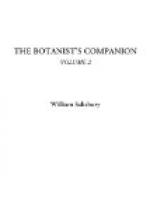367. Nigella romana. Fennel-flower. The Seeds.—They have a strong, not unpleasant smell; and a subacrid, somewhat unctuous disagreeable taste. They stand recommended as aperient, diuretic, &c. but being suspected to have noxious qualities should be used with caution.
368. NYMPHAEA alba. White water-Lily. The Root and Flowers.—These have a rough, bitterish, glutinous taste, (the flowers are the least rough,) and when fresh a disagreeable smell, which is in great measure lost by drying: they are recommended in alvine fluxes, gleets, and the like. The roots are supposed by some to be in an eminent degree narcotic.
369. Ocymum Basilicum. Basil. The Leaves.—These have a soft, somewhat warm taste; and when rubbed, a strong unpleasant smell, which by moderate drying becomes more agreeable. They are said to attenuate viscid phlegm, promote expectoration, and the uterine secretions.
370. OPHIOGLOSSUM vulgatum. Adders-tongue. The Leaf.—An ointment is made of the fresh leaves, and it is a good application to green wounds. It is a very antient application, although now discarded from the apothecary’s shop.
371. Paeonia corolloides. Male peony. The Seeds.—These are strong, and worn round the neck to assist detention, and are probably as good as other celebrated anodyne beads which have been so long recommended for the same purpose.
372. Phellandrium aquaticum. Water hemlock.—The seeds of this plant, according to Dr. Lange, when taken in large doses, produce a remarkable sensation of weight in the head, accompanied with giddiness, intoxication, &c. It may probably prove, however, an active medicine, especially in wounds and inveterate ulcers of different kinds, and even in cancers; also in phthisis pulmonalis, asthma, dyspepsia, intermittent fevers, &c. About two scruples of the seed, two or three times a-day, was the ordinary dose given. Medicines of this kind should be used with great caution.—Woodville’s Med. Bot. p. 91, 92.
373. PIMPINELLA saxifraga. Burnet saxifrage. The Root, Leaves, and Seeds.—This root promises from its sensible qualities, to be a medicine of considerable utility, though little regarded in common pratice. Stahl, Hoffman, and other German physicians, are extremely fond of it, and recommend it as an excellent stomachic, resolvent, detergent, diuretic, diaphoretic, and alexipharmic.
374. Plantago major. Common broad-leaved plantain.—The leaves are slightly astringent, and the seeds said to be so; and hence they stand recommended in haemorrhages, and other cases where medicines of this kind are proper. The leaves bruised a little, are the usual application of the common people to slight flesh wounds. The Edinburgh College used to direct an extract to be made from the leaves.




